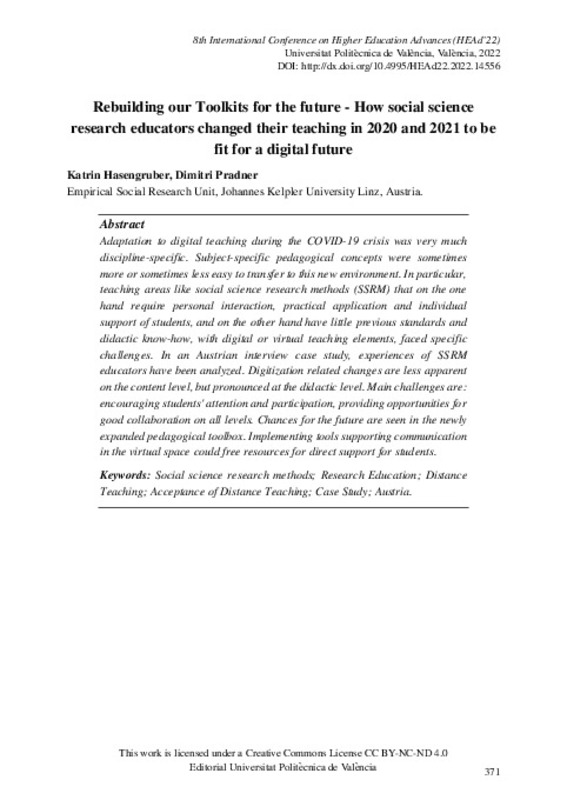JavaScript is disabled for your browser. Some features of this site may not work without it.
Buscar en RiuNet
Listar
Mi cuenta
Estadísticas
Ayuda RiuNet
Admin. UPV
Rebuilding our Toolkits for the future - How social science research educators changed their teaching in 2020 and 2021 to be fit for a digital future
Mostrar el registro sencillo del ítem
Ficheros en el ítem
| dc.contributor.author | Hasengruber, Katrin
|
es_ES |
| dc.contributor.author | Prandner, Dimitri
|
es_ES |
| dc.date.accessioned | 2023-02-22T11:29:39Z | |
| dc.date.available | 2023-02-22T11:29:39Z | |
| dc.date.issued | 2022-05-31 | |
| dc.identifier.isbn | 9788413960036 | |
| dc.identifier.issn | 2603-5871 | |
| dc.identifier.uri | http://hdl.handle.net/10251/192026 | |
| dc.description.abstract | [EN] Adaptation to digital teaching during the COVID-19 crisis were not the same for all disciplines. Subject-specific pedagogical concepts were sometimes more or sometimes less easy to transfer to this new environment. In particular, teaching areas like social science research methods (SSRM) that on the one hand require personal interaction, practical application and individual support of students, and on the other hand have little previous standards and didactic know-how, with digital or virtual teaching elements, faced specific challenges. In a [COUNTRY] interview study, experiences of SSRM educators have been analyzed. Digitization related changes are less apparent on the content level, but pronounced at the didactic level. Main challenges are: encouraging students' attention and participation, providing opportunities for good collaboration on all levels. Chances for the future are seen in the newly expanded the pedagogical toolbox. Implementing tools supporting communication in the virtual space could free resources for direct support for students. | es_ES |
| dc.format.extent | 8 | es_ES |
| dc.language | Inglés | es_ES |
| dc.publisher | Editorial Universitat Politècnica de València | es_ES |
| dc.relation.ispartof | 8th International Conference on Higher Education Advances (HEAd'22) | |
| dc.rights | Reconocimiento - No comercial - Sin obra derivada (by-nc-nd) | es_ES |
| dc.subject | Social science research methods | es_ES |
| dc.subject | Research education | es_ES |
| dc.subject | Distance teaching | es_ES |
| dc.subject | Acceptance of Distance Teaching | es_ES |
| dc.subject | Case study | es_ES |
| dc.subject | Austria | es_ES |
| dc.title | Rebuilding our Toolkits for the future - How social science research educators changed their teaching in 2020 and 2021 to be fit for a digital future | es_ES |
| dc.type | Capítulo de libro | es_ES |
| dc.type | Comunicación en congreso | es_ES |
| dc.identifier.doi | 10.4995/HEAd22.2022.14556 | |
| dc.rights.accessRights | Abierto | es_ES |
| dc.description.bibliographicCitation | Hasengruber, K.; Prandner, D. (2022). Rebuilding our Toolkits for the future - How social science research educators changed their teaching in 2020 and 2021 to be fit for a digital future. En 8th International Conference on Higher Education Advances (HEAd'22). Editorial Universitat Politècnica de València. 371-378. https://doi.org/10.4995/HEAd22.2022.14556 | es_ES |
| dc.description.accrualMethod | OCS | es_ES |
| dc.relation.conferencename | Eighth International Conference on Higher Education Advances | es_ES |
| dc.relation.conferencedate | Junio 14-17, 2022 | es_ES |
| dc.relation.conferenceplace | Valencia, España | es_ES |
| dc.relation.publisherversion | http://ocs.editorial.upv.es/index.php/HEAD/HEAd22/paper/view/14556 | es_ES |
| dc.description.upvformatpinicio | 371 | es_ES |
| dc.description.upvformatpfin | 378 | es_ES |
| dc.type.version | info:eu-repo/semantics/publishedVersion | es_ES |
| dc.relation.pasarela | OCS\14556 | es_ES |
| dc.contributor.funder | Bundesministerium für Bildung, Wissenschaft und Forschung, Austria | es_ES |








